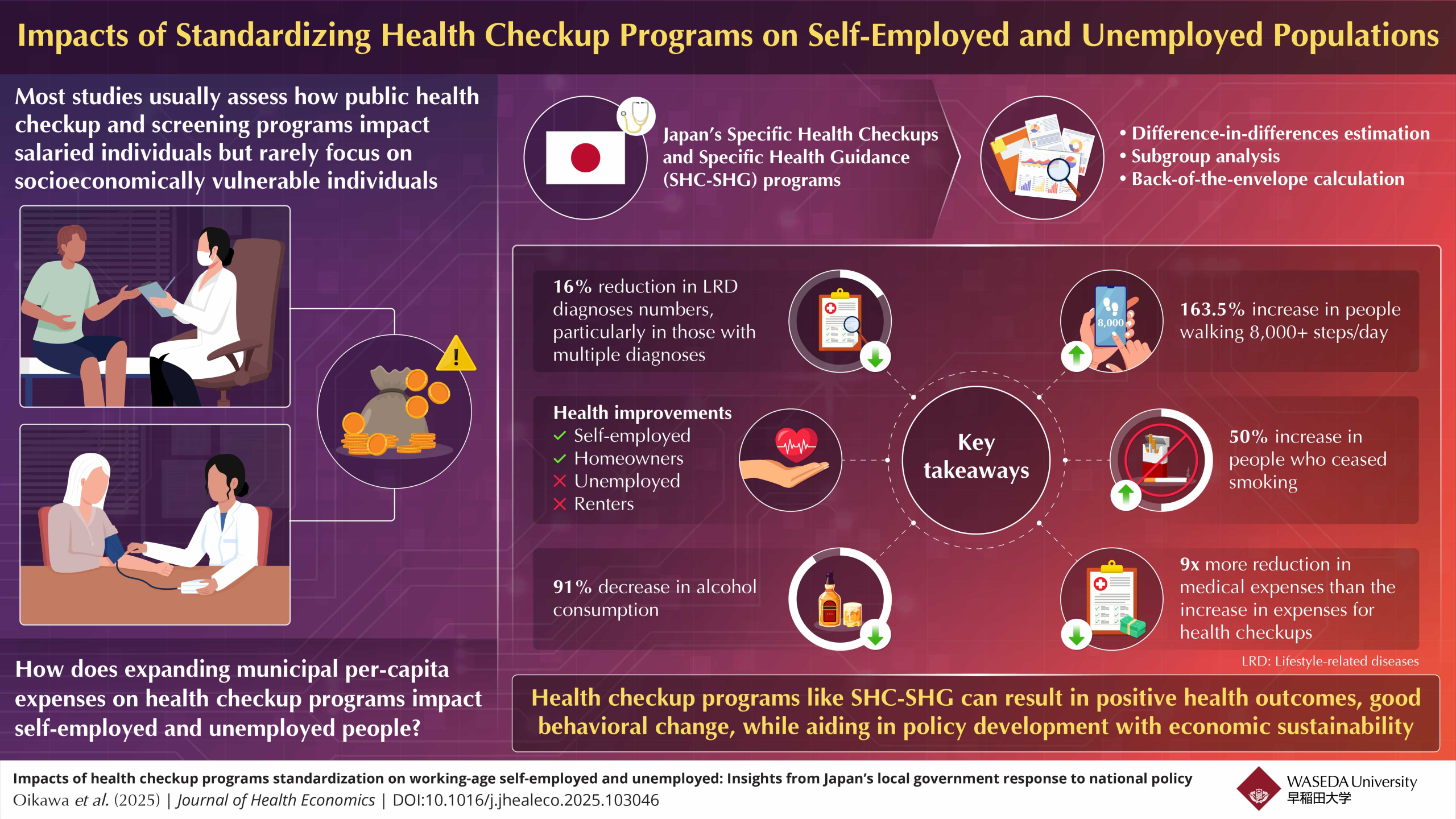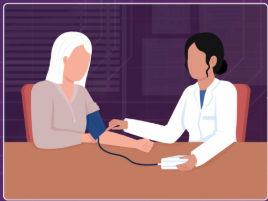Japan’s National Standardized Health Checkup Program: Impacts on Self-Employed and Unemployed Populations
Mon, Sep 29, 2025-
Tags
Japan’s National Standardized Health Checkup Program: Impacts on Self-Employed and Unemployed Populations
Researchers assess how expanding municipal expenses on health checkup programs affect health outcomes and behaviors of self-employed and unemployed citizens
Lifestyle-related diseases are rapidly increasing, particularly among the lower socioeconomic brackets of the society. To address this public health concern, Japan introduced the Specific Health Checkups and Specific Health Guidance policy in 2008. The policy mandates municipalities across Japan to standardize health checkups for all populations. This study explored how the policy and its resultant expansion in municipal healthcare funds have impacted health outcomes and lifestyle behaviors among self-employed and unemployed individuals.

Image title: Impact of expanding municipal expenses on health checkup programs on self-employed and unemployed populations
Image caption: A new study has now evaluated the positive impacts of Specific Health Checkups and Specific Health Guidance standardization particularly among the self-employed and unemployed populations. The study highlights the improvements in health outcomes and lifestyle behaviors among these populations, and also the economic viability of expanding municipal resources for scaling up such health checkup programs.
Image credit: Dr. Masato Oikawa from Waseda University, Japan
License type: Original content
Usage restrictions: Cannot be reused without permission
Rapidly aging populations and rising cases of lifestyle-related diseases (LRDs), like diabetes and hypertension, are driving significant financial strain on government budgets. While regular health checkups under a standardized government program can be a solution, it is not well understood how these initiatives benefit different socioeconomic sections of the society and their economic feasibility. Most studies have documented how health checkup programs affect salaried or employed workers, examining the program’s role in informing individuals about their health status and risks. However, there is limited research on self-employed and unemployed populations, even though these socioeconomic communities are at a greater risk of developing LRDs.
To mitigate this research gap, Assistant Professor Masato Oikawa from the Faculty of Education and Integrated Arts and Sciences, Waseda University, Japan, evaluated the effects of health screening programs on health outcomes, municipal healthcare expenditure, and behaviors among self-employed and unemployed individuals. Dr. Oikawa along with Mr. Takamasa Otake from University of Pennsylvania, United States, Dr. Toshihide Awatani from Kochi Medical School, Japan, Dr. Haruko Noguchi and Dr. Akira Kawamura from Waseda University, used the Specific Health Checkups and Specific Health Guidance (SHC-SHG), implemented by the Japanese government in 2008, as the basis of their assessment.
“We used dosing difference-in-differences estimation and subgroup analysis to explore the effects of increasing municipal expenditure under the SHC-SHG policy standardization on health outcomes and behaviors among the self-employed and unemployed individuals. Additionally, we did a back-of-the-envelope calculation to estimate the cost-effectiveness of this increase in municipal funds for health checkup programs,” explains Dr. Oikawa. Their study was made available online on August 08, 2025, and was published in Volume 103 of the Journal of Health Economics on September 01, 2025.
The assessments revealed that the SHC-SHG program led to a 16% reduction in the number of self-employed and unemployed people diagnosed with LRDs, with more noticeable effects on individuals with multiple diagnoses than those with a single diagnosis. This suggests that the program is effective in reducing the number of patients with severe conditions, in addition to lowering the overall prevalence of LRD cases.
However, the resultant health improvements were only seen among self-employed individuals and homeowners, but not among unemployed people and renters. Despite this, there were significant good behavioral changes among both self-employed and unemployed people, including a 50% increase in smoking cessation rates, 91% reduction in alcohol consumption, and 163.5% increase in people walking more than 8,000 steps daily.
Furthermore, the increase in municipal health checkup funds was found to be cost-effective, with the overall reduction in medical expenses outweighing the increase in municipal costs by approximately nine times (USD 216.4 million reduction versus USD 23.7 million increase). This suggests that preventive health services and checkups are crucial for improving public health outcomes for lower socioeconomic populations— who face higher risks of LRDs— and thereby mitigating the future financial burden on municipalities.
These findings have clear and immediate applications for policymakers in Japan and other countries facing similar demographic and public health challenges. Policymakers should design and prioritize preventive healthcare programs, particularly for socioeconomically vulnerable populations, to improve public health and reduce long-term costs. Moreover, these programs must be tailored to different socioeconomic groups, addressing the barriers specific to unemployed individuals, such as the perceived high cost of checkups or a lack of understanding about the asymptomatic nature of LRDs.
“Our research demonstrates the economic value of standardized health checkups for improving a country’s overall resilience to public health crises and also sheds light on areas where such programs can be upgraded and made more equitable for everyone. We believe that addressing the health needs of all socioeconomic populations is crucial for the sustainability of the social security system,” concludes Dr. Oikawa.
Reference
Title of original paper: mpacts of health checkup programs standardization on working-age self-employed and unemployed: Insights from Japan’s local government response to national policy
DOI:10.1016/j.jhealeco.2025.103046
Journal: Journal of Health Economics
Article Publication Date: 01 September 2025
Authors: Masato Oikawaa,b , Takamasa Otakec,b, Toshihide Awatanid,b, Haruko Noguchie,b, and Akira Kawamuraf,b
Affiliation:
a Faculty of Education and Integrated Arts and Sciences, Waseda University, Japan
b Waseda Institute of Social & Human Capital Studies (WISH), Japan
c Wharton School, University of Pennsylvania, United States
d Department of Family Medicine, Kochi Medical School, Japan
e Faculty of Political Science and Economics, Waseda University, Japan
f Faculty of Human Sciences, Waseda University, Japan
About Assistant Professor Masato Oikawa from Waseda University
Dr. Masato Oikawa has been an Assistant Professor (tenure-track) at the Faculty of Education and Integrated Arts and Sciences, Waseda University, Japan, since April 2025. Before this, he taught as an Assistant Professor in the non-tenure track at other faculties at Waseda University. He completed his Ph.D. in Economics from the University of Tokyo. Dr. Oikawa’s research focus lies in health economics, applied microeconometrics, and economics of education. He has 10 peer-reviewed publications to his name. He is the recipient of the Excellent Paper Award at the 12th Applied Econometrics Conference and the 30th Hongyo Prize from Yokohama National University.














